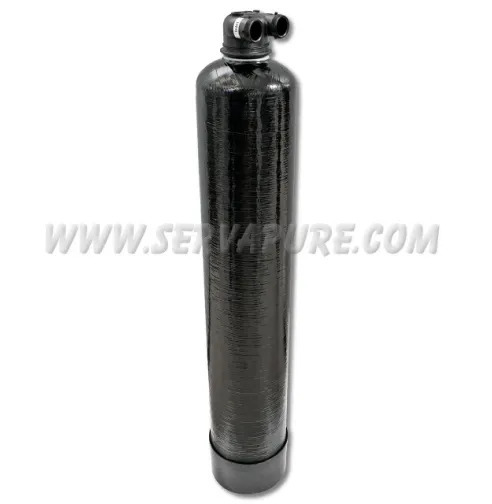SHOWING ITEMS 1-15 of 19
-

Serv-A-Pure 844, SAP-844-CARB, Industrial Carbon Tank, 8" x 44", 1.0 Cu. Ft.
MSRP: $954.00Your Price: $725.00 -

ServAPure 818 Industrial Deionization Tank, 8" x 18" 0.5 Cu. Ft.
MSRP: $622.00Your Price: $515.00 -

ServAPure 1354 Industrial Deionization Tank, 13" x 54" 3.75 Cu. Ft.
MSRP: $1,950.00Your Price: $1,595.00 -

ServAPure WP400-KIT, Resin Exchange Kit for WashPak-400 & MiniPak 844 Tanks
MSRP: $325.00Your Price: $250.00 -

ServAPure WP50100-KIT, Resin Exchange Kit for WashPak-50 or 100
MSRP: $225.00Your Price: $175.00 -

ServAPure WashPak-50, Spot Free Rinse System, ServAPure 818 DI Tank, 0.50 Cu. Ft. *FREE SHIPPING IN USA
MSRP: $525.00Your Price: $409.00 -

ServAPure WashPak-100, Spot Free Rinse System, ServAPure 835 DI Tank, 1.00 Cu. Ft. *FREE SHIPPING IN USA
MSRP: $645.00Your Price: $515.00 -

ServAPure WashPak-400, Spot Free Rinse System, ServAPure 1354 DI Tank, 3.75 Cu. Ft. *FREE SHIPPING IN USA
MSRP: $1,950.00Your Price: $1,550.00 -

ServAPure 1447 General Purpose Tank EMPTY, 3.75 Cu. Ft. Capacity
MSRP: $998.00Your Price: $695.00 -

ServAPure 844 General Purpose Tank EMPTY, 1.25 Cu. Ft. Capacity
MSRP: $374.00Your Price: $277.20 -

ServAPure 835 General Purpose Tank EMPTY, 1.0 Cu. Ft. Capacity
MSRP: $345.20Your Price: $255.70 -

ServAPure 635 General Purpose Tank EMPTY, 0.60 Cu. Ft. Capacity
MSRP: $329.50Your Price: $244.00 -

ServAPure 618 General Purpose Tank EMPTY, 0.25 Cu. Ft. Capacity
MSRP: $307.80Your Price: $228.00 -

Serv-A-Pure 1447 General Purpose Deionization Tank, 14" x 47", 3.75 Cu. Ft.
MSRP: $1,795.00Your Price: $1,595.00 -

ServAPure 818 General Purpose Tank EMPTY, 0.44 Cu. Ft. Capacity
MSRP: $309.50Your Price: $229.00
Secure and Reliable Deionized Water Storage
Proper deionized water storage is essential. A dedicated DI tank prevents recontamination, maintains consistent conductivity readings, and supports stable dispensing routines. Serv‑A‑Pure offers deionized water tanks that meet purity standards across laboratory, commercial, and industrial environments.
Our DI tanks come in various capacities, from small reservoirs to larger stainless or polypropylene vessels. Tanks feature secure fittings, vented caps, and optional resistivity probes to enable accurate monitoring. Each deionized water tank supports easy maintenance and safe handling while preserving water integrity.

Benefits of A Serv‑A‑Pure DI Tank
Investing in the right DI tank is essential to preserving water purity, maintaining system efficiency, and preventing contamination. Serv‑A‑Pure DI tanks are engineered to support a wide range of high-purity applications, offering features that help streamline operation and ensure long-term performance. Whether integrated into a point-of-use system or used as part of a centralized distribution loop, these tanks are built with reliability and clean water compatibility in mind.
- Ultra-Pure Materials – Constructed from deionization-compatible plastics or stainless steel to reduce the risk of leaching and chemical contamination.
- Tight Sealing Design – Secure lid and fitting designs prevent airborne or environmental contamination, helping maintain high resistivity levels.
- Capacity Options – Offered in a range of volumes to match system output and application demand, from lab-scale systems to industrial setups.
- Optional Monitoring Accessories – Easily pair with resistivity sensors, float valves, overflow protection, and dispensing valves to support safe and efficient operation.
- Secure Installation – Choose from bench mount, shelf mount, or floor-standing models, depending on your space constraints and system layout.
- Easy Integration – Designed to connect seamlessly with existing DI water systems, tubing, and fittings, reducing setup time and compatibility issues.
Common Applications for Deionized Water Tanks
These storage solutions support operational needs across lab, process, and industrial settings.
Laboratory and Analytical Testing
Labs using DI systems for reagent prep, rinsing, or mobile dispensing require controlled storage environments. A DI water tank ensures consistent ultra-pure water is available on demand without reliance on frequent refill cycles.
Industrial and Manufacturing Processes
Deionized water is used in plating baths, final rinse stations, and equipment flushing. An appropriately sized deionization tank enables steady supply and helps prevent spikes in conductivity that could interfere with downstream applications or machinery.
Point-of-Use and Dispensing Stations
DI tanks integrated at point-of-use stations supply clean water directly to dispensers, wash stations, and rinse loops. This eliminates lengthy plumbing and helps maintain resistivity levels close to 18 megohm‑cm at the outlet.
Backup or Emergency Storage
Facilities that operate on-demand or have scheduled purification cycles benefit from having stored DI water ready. These deionized water tanks provide buffer capacity to prevent downtime during system maintenance or peak usage periods.
Cleanroom or Controlled Environment Operation
In controlled manufacturing or cleanroom environments, maintaining water purity is critical. A deionized water tank with sample ports and secure covers reduces risk of particulate ingress and ensures compliance with cleanliness protocols.
Frequently Asked Questions About A DI Tank
Here are answers to questions that extend beyond basic product descriptions for better decision-making:
What capacity tank do I need for my DI system?
Choose based on daily water usage and refill frequency. Typical lab users need 2-20 gallons; industrial operations may require hundreds. Reserve capacity should allow buffer to avoid frequent refills.
Can DI water storage tanks be installed outdoors?
Outdoor installation is generally not recommended unless tanks are UV-stabilized and shaded. Temperature fluctuations and UV exposure can degrade materials and allow algae growth.
How do I clean and maintain a DI tank?
Use DI-grade rinsing only—no detergents. Drain fully, rinse with DI water, sanitize with dilute peroxide if needed, then rinse again before refilling.
Are there sensors or accessories recommended for DI tanks?
You can add resistivity probes, level switches, overflow protection, and dispensing taps. These accessories help monitor water purity, volume, and prevent spill risks.
Get the Right DI Tank for Your Storage Needs
Need help picking a DI tank that matches your system’s output and usage pattern? Contact Serv‑A‑Pure today. Our team can assist with sizing calculations, accessory recommendations, and provide fast delivery so your deionized water remains pure and accessible.
Get in Touch Today

